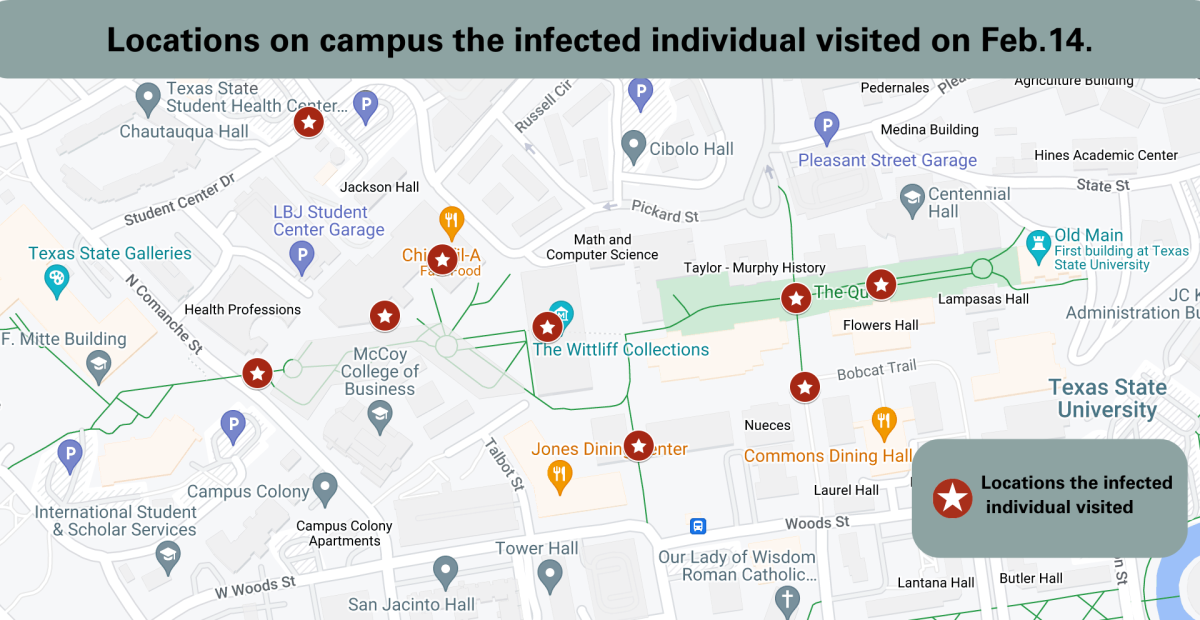Despite the residents of San Marcos embracing a progressive shift in the stigma surrounding marijuana through the passage of Proposition A (Prop A) in November 2022, the University Police Department (UPD) still issues citations and arrests for any amount of marijuana in ones possession.
Prop A saw a resounding 81.84% approval, ending marijuana-related arrests and citations for up to four ounces. Texas State, however, retains the ability to set its own rules, separate from the city’s ordinances.
Despite the city passing Prop A, the San Marcos Police Department (SMPD) continues to press charges for marijuana possession, citing a clause in the Texas Local Government Code that restricts the creation of policies opposing drug law enforcement.
UPD Chief of Police Matthew Carmichael said there is close collaboration between the police department and the dean of students in handling marijuana-related offenses. The approach to these situations, however, is determined on a case-by-case basis.
“If it’s a low-level violation, they could be warned. If it’s a student then referred to the dean of students, they could be issued a citation or depending if it’s a Class A misdemeanor they could be arrested,” Carmichael said.
Communications Director for Mano Amiga, a political advocacy group, Sam Benavides said because students can still face marijuana criminalization, it can lead to potential employers and landlords finding that record.
“There are so many collateral consequences that can impact [students] and their life due to a really petty offense,” Benavides said.
Blake Coe, president and cofounder of the Texas State chapter for Students for Sensible Drug Policy (SSDP), said the university’s marijuana policy significantly impacts freshman students, whose on-campus living restrictions confine their activities primarily to the university premises.
“The difference in policies between the city and the university adds to this environment of fear on the stigma surrounding marijuana,” Coe said.
Coe said the university’s resistance to Prop A is likely due to the Board of Regents’ influence over Texas State’s policies, rather than the university’s autonomy in decision-making.
In Texas, the governor appoints regents for all public university systems, like Texas State. These regents are responsible for shaping policies across various domains, ranging from personnel matters to campus development, student tuition, admissions and financial aid. Therefore, any proposal for a marijuana decriminalization policy on campus would need approval from this governing board before implementation.
Prop A served as the catalyst for the emergence of Texas State’s SSDP chapter and also prompted a series of proactive measures at Mano Amiga.
One of the outcomes was the establishment of Texas State’s Mano Amiga chapter. Additionally, Mano Amiga launched a campaign aimed at repealing SMPD’s civil status and its goal is to hold lawless law officers accountable for their actions. Furthermore, it spearheaded another marijuana decriminalization campaign in Lockhart, Texas.
Under the Drug-Free Schools and Communities Act (DFSCA), for an institution of higher education, like Texas State, to receive federal funding it must adopt a program that restricts unlawful possession, use or distribution of drugs.
Carmichael said compliance with the DFSCA is imperative for UPD as it safeguards various forms of financial aid, grants, scholarships and other monetary opportunities funded by the federal government.
“I would imagine changes [to the current marijuana policy at Texas State] would have to be at the state level,” Carmichael said. “You’re talking about the school’s ability to receive federal funding.”
Coe, however, said the university’s marijuana decriminalization policy should be different on campus, especially regarding small amounts of possession, since the university already implements a no smoking and tobacco-free policy on its campus grounds.
“You can still enforce that part of being in the building and not smoking on campus without having to involve students in the criminal justice system and kicking them out of the education system,” Coe said.
Benavides said her concern is the university’s policy might not be in the best interest of the students or staff, as she believes it could potentially jeopardize their future.
“I feel like the lack of an official policy with the UPD that decriminalizes a low-level possession of marijuana, speaks to the lack of compassion and care the university leadership has for their students,” Benavides said.
A worry Carmichael has is since marijuana is not legalized in Texas, there is no safe source for the production and purchase of the drug.
Carmichael said UPD is starting to train campus partners and sorority members on how to deal with opioid overdose, considering its prevalence as an emerging epidemic.
“We’re starting to see an increase nationally in marijuana being laced with fentanyl,” Carmichael said.
Coe said Prop A is a step in the right direction but isn’t the final goal. SSDP is focusing on educating and raising awareness of what the Prop A policy actually entails.
“We are probably going to start a petition,” Coe said. “If this could end up going to the Board of Regents, we can’t go with nothing.”





















